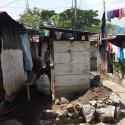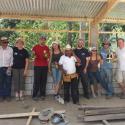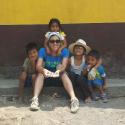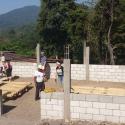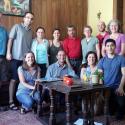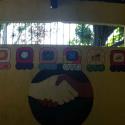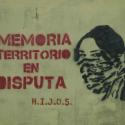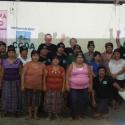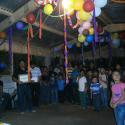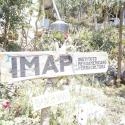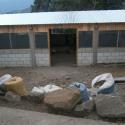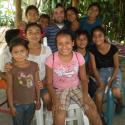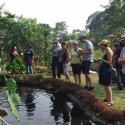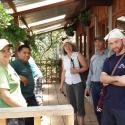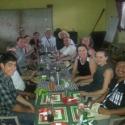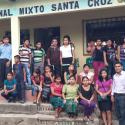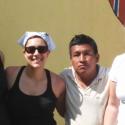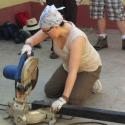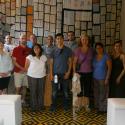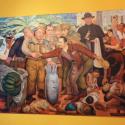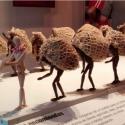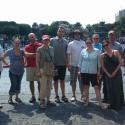PSAC members participated in PSAC's Social Justice Fund delegation to Guatemala. They supported the efforts of grassroots organizations to improve livelihoods of Mayan campesinos in Guatemala. Jen Botincan, a PSAC/UNDE member from Winnipeg, was selected to participate in this opportunity. Read her final report about the experience and view some of her photos. She also wrote a series of blog entries about her experiences for the PSAC Prairie Region website.
I applied in late 2012 for the 2013 Young Workers’ Delegation in Guatemala and will never forget how excited and sad I was when I received the call from our local president, Mona Simcoe, to let me know I had been chosen to represent the Prairie Region, but that the trip was cancelled. A young man lost his life fighting for social justice and our safety couldn’t be guaranteed.
When applying to attend the delegation I knew Guatemala had a violent past, but I did not realize how dangerous it still is. The reality is that the people in Guatemala are constantly placing their lives on the line to support fairness for all. Because positive change is sometimes fought with resistance, I knew that the organisations in Guatemala supporting social justice initiatives were making an impact. That’s why supporting social justice initiatives, such as Education in Action, are so incredibly important.
Luckily, from March 21, 2014 to April 4, 2014, I was able to go to Quixayá, Guatemala with ten other people where we would work hand in hand with grassroots organisations and learn from those directly affected by Guatemala’s violent past/present and inequality.
When we arrived in Guatemala City a few things were really apparent. It was HOT (even at 10 p.m.) and it looked pretty dangerous because the streets were completely deserted with barricaded doors and lots of barbed wire. We were ushered inside the hostel we would stay in for a few nights and not allowed to venture alone while there.
The next morning we met people from Fundacïon de Anthropologia Forense de Guatemala (FAFG) that talked about ‘the disappeared’; over 200,000 Guatemalans that were murdered during the civil war, a large number of those were indigenous peoples. It amazed me how little most people know about it. We later learned that even people within Guatemala do not learn about its history and, because of that, deny it ever occurred.
Later that day we met Dr. Yuri Melini from the Centro de Accïon Legal Ambiental y Social de Guatemala (CALAS). Yuri has put his life on the line to fight against environmental exploitation and political corruption in Guatemala. Luckily he survived being shot at 16 times so he could share his story and keep inspiring others to stand up for what they believe in. That’s why it’s important to share what we learned - sharing stories of injustice will help provide international pressure to ensure those responsible for crimes against humanity are prosecuted and their convictions upheld. After being left with all of this new knowledge the group was ready to help in any way we could.
We headed to Quixayá to stay with Leocadio Juracan and his family for the majority of our two week stay in Guatemala. Their hospitality was second to none––I will forever be grateful and hope to return it one day. Quixayá was much safer than Guatemala City, but the poverty in the surrounding areas was astonishing.
During our ten day stay there we put a roof on an indigenous school, Centro Educativo Comunal Mixto Santa Cruz, and built a community centre in San Filipe. Some of the delegation worked with doctors that provided check-ups and care for over 400 children. The people in the communities we worked with rallied together and thanked us with food, drink, and music during receptions. Everyone was thanking us, but all I wanted to do was thank them all for making us feel like a part of their community.
We worked hand in hand with the CCDA (Campesino Committee of the Highlands Comitï Campesino del Altiplano) and learned more about what they do. The organisation has numerous projects providing agricultural sustainability lessons, fairness, and gender equality for indigenous peoples. Along with that, they complete a lot of political activism work for land reform.
We met so many amazing people in those two weeks and did some incredible things. I detailed many of the day-to-day activities in my blog on the PSAC Prairies website. Writing in the blog served two purposes: it provided a living record of our experiences for all to share and it was a way for me to process what we were experiencing without becoming overcome with emotion over the societal conditions some are expected to survive in.
Life in Guatemala is a struggle, but the people there are so filled with passion and kindness you would never know how much of a struggle it truly is. The level of injustice the people of Guatemala have faced would be unfathomable had we not seen and heard first-hand accounts of it. What absolutely amazes me is that despite everything the people there face––stark poverty, oppression, inequality, exploitation of land and resources––they are incredibly hopeful and happy people.
I learned that we don’t change things by going down to a country in need and building a community centre, or meeting people and hearing their stories. And we don’t need to change things, because we can’t, nor is it our place to. The people on the front lines change things. We can help, though. We can help by supporting those people and organisations that believe in the very same things we do; the things we have fought for and won, like fair wages and benefits to provide for our most fundamental human needs. The only difference between us is that we don’t have to put our lives on the line for those basic rights.
Solidarity doesn’t end at our border––international causes are the same as ours. For the same reason we support unionized companies we need to continue to support international social justice initiatives. Together we are strong.
I urge you; please encourage your young workers to apply to be a part of a future Social Justice Fund delegation. It has provided a renewed sense of strength and passion to protect everything generations have worked so hard to gain for us all. Delegations like these are crucial to build solidarity, and the people in Guatemala especially need our support.
However, you don’t have to go on a delegation to be able to help. You can support international non-profits through donations, signing petitions, and buying fair trade. Don’t stop because you think you’re not making a change. Small contributions do make a huge impact. We saw this first-hand. If people are willing to put their life on the line, providing a few minutes or dollars is really the least we can do.
For this project, in particular, it’s amazing how something as simple as coffee can help fund projects that make huge impacts on thousands of people. Please contact Janet St-Jean at PSAC's Social Justice Fund to purchase some organic and fair trade coffee and chocolate––100% of the money made goes to fund the CCDA and their projects.
We just had our post-delegation re-entry session and I realized that, although the delegation finished up a few months ago, we have made friends for life with one really amazing shared experience that has changed us forever. I am grateful for the experience thanks to the PSAC Social Justice Fund and Education in Action.
In Solidarity,
Jen Botincan
Union of National Defence Employees, Local 50705
MB/SK Young Workers’ Representative

